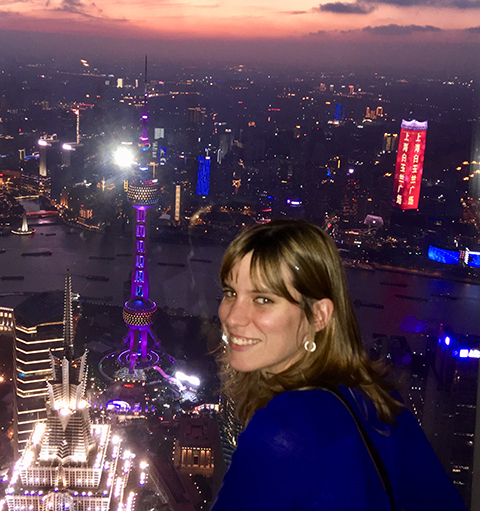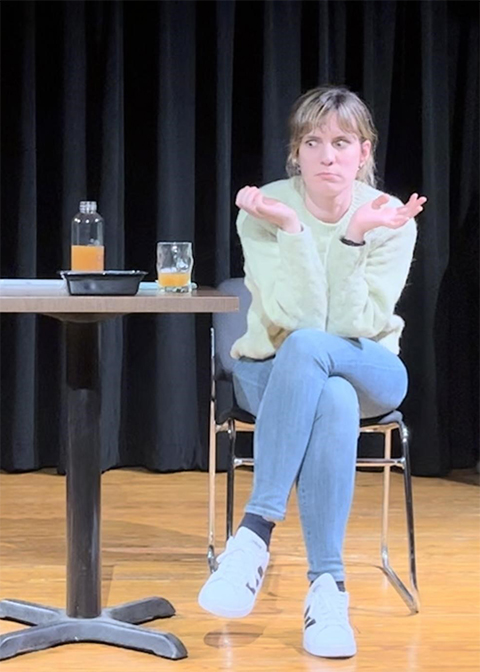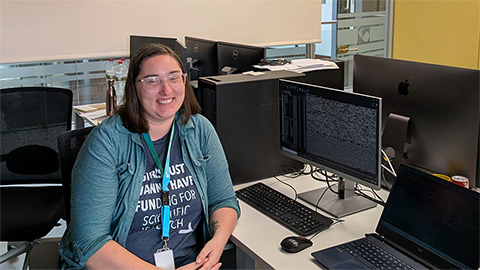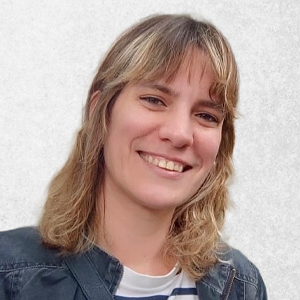
‘Who am I?’ Finding yourself in a different country
Have you ever fallen in love? If you have, you might remember the excitement that can last anywhere from a few weeks to a few months: the honeymoon phase. You might have felt the same initial excitement when you started a new job or a new project — or if you ever moved to a different country.
For non-U.S. scientists, it is quite common to spend time working abroad, doing a Ph.D. or a postdoc. In my case, I moved twice to two different continents while I was pursuing my scientific dreams, and each time I was instantly fascinated by my adoptive country.

Soon after I graduated with my Ph.D. in Barcelona, Spain, I accepted a two-year postdoc position in Shanghai. I was scared and excited at the same time, embarking on a journey where I discovered a new scientific field and a culture different from my own. However, after the first year, the language barrier started to have a psychological impact on me. My day-to-day interactions were limited to scientific conversations; the rest of the time, I couldn't understand the people around me. I felt very isolated.
I decided that if I were ever to move to a different country again, it had to be a place where I could speak the language.
For my second postdoc, I not only moved to a country whose language I was able to speak, the U.S., but also to a city where some of the best science in the world is done, Boston. I was in love again. I walked the streets as if I were in a movie. Visiting Harvard and MIT, I felt I could face any challenge; after all, I was living my dream. This time without any barrier — at least, that’s what I thought.
A few months in, when my honeymoon phase started fading, I encountered unexpected challenges. I was the only person in the lab who wasn’t a native English speaker, and I’d get lost in group conversations outside work if someone used a word I didn’t know or cultural references I didn’t grow up with. I felt like an outsider.
My perfectionism didn’t help; I would try to ensure my grammar was impeccable before allowing myself to say a single word, or I’d struggle to find the right term. Those situations often led to a lost opportunity; the conversation carried on without me, and I felt like I couldn’t be fully myself.
I started talking to a friend from Mexico, who is also a scientist, and I discovered I wasn’t the only one having these feelings. We’d talk about how using a language that wasn’t our own was exhausting, how we felt we could be perceived as less smart because of our accent or the extra effort to find the right words, and how that could affect our self-esteem. My friend pointed out that when cultural and linguistic context changes completely, existing within these new circumstances, even if we chose them, can be challenging.

This disengagement arose alongside another issue: I wasn’t able to visit my home country for a very long time — only twice in more than three years — due to my visa status, which added homesickness to what I started calling “the silent burden.”
How can someone alleviate feelings of alienation, when they are far from home? I have regained self-confidence by engaging in projects that allow me to build a support network and find people with whom I have things in common — a group of Spanish researchers in the U.S. Also, I explore new spaces where I can keep my curiosity alive and reconnect with myself outside of work.
When I joined an acting course, I realized I enjoyed communicating messages to an audience. I discovered a creative side of myself that I didn’t know existed. And, unexpectedly, this helped me gain confidence.
In my first acting class, I had to read aloud, and I realized I was the only foreigner in the room. Reading a theatrical text for the first time in front of an audience is not easy, especially if it is not in your first language. I was terrified.
Then I thought: “How can you be so afraid of this, with all the difficult situations you’ve faced in your life? If you were able to find places in China knowing just two words in Mandarin, why do you care if someone thinks you’ve got a strong accent?”
For the first time, I felt proud of myself just for daring to face challenges.
Who am I? It is a developing story. Whatever new challenge I face, I will find new answers and learn things I would have never imagined had I not decided to become an immigrant scientist.
While our world can change radically, the good news is that we are all resilient and we can adapt if we use the tools at our disposal.
Enjoy reading ASBMB Today?
Become a member to receive the print edition four times a year and the digital edition monthly.
Learn moreGet the latest from ASBMB Today
Enter your email address, and we’ll send you a weekly email with recent articles, interviews and more.
Latest in Opinions
Opinions highlights or most popular articles

Women’s health cannot leave rare diseases behind
A physician living with lymphangioleiomyomatosis and a basic scientist explain why patient-driven, trial-ready research is essential to turning momentum into meaningful progress.

Making my spicy brain work for me
Researcher Reid Blanchett reflects on her journey navigating mental health struggles through graduate school. She found a new path in bioinformatics, proving that science can be flexible, forgiving and full of second chances.

The tortoise wins: How slowing down saved my Ph.D.
Graduate student Amy Bounds reflects on how slowing down in the lab not only improved her relationship with work but also made her a more productive scientist.

How pediatric cataracts shaped my scientific journey
Undergraduate student Grace Jones shares how she transformed her childhood cataract diagnosis into a scientific purpose. She explores how biochemistry can bring a clearer vision to others, and how personal history can shape discovery.

Debugging my code and teaching with ChatGPT
AI tools like ChatGPT have changed the way an assistant professor teaches and does research. But, he asserts that real growth still comes from struggle, and educators must help students use AI wisely — as scaffolds, not shortcuts.

AI in the lab: The power of smarter questions
An assistant professor discusses AI's evolution from a buzzword to a trusted research partner. It helps streamline reviews, troubleshoot code, save time and spark ideas, but its success relies on combining AI with expertise and critical thinking.

